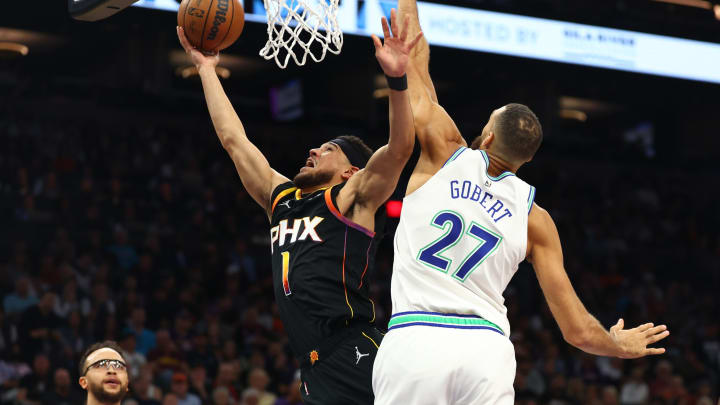Rudy Gobert's 64-hour darkness retreat sparked his vision for the Wolves defense

In this story:
Rudy Gobert is the centerpiece of the No. 1 defense in the NBA, rising to the occasion when the basketball world cast a shadow of doubt on the 31-year-old’s ability to play on the floor at the same time as fellow 7-footer Karl-Anthony Towns.
Long gone are the days of yesteryear when Minnesota was the laughing stock of the league, and much of the credit goes to Gobert, whose vision during a 64-hour darkness retreat has been included in the blueprint of Minnesota's elite defense.
"Actually when we sat down and had dinner this summer it was right after his darkness retreat,” Timberwolves head coach Chris Finch told Chad Hartman on WCCO-AM 830 on Tuesday. "He was very, very excited about it. I think it was one of the catalysts for his, literally his vision, on what he thought this team could be defensively and we've had a lot of discussion around that."
“So yeah, he's very much...kind of rejuvenated by that experience,” Finch added.
Finch didn’t elaborate, but Gobert protecting the rim — averaging 2.4 blocks per game — while disrupting shots and being a nuisance in passing lanes has helped Minnesota mature into a contender after spending last season blowing 18 double-digit leads and sneaking into the playoffs only to get ousted in the first round by the Denver Nuggets.
Year 1 of the Gobert experience was a disaster, but Year 2 has fueled Minnesota to the league's best record (15-4) entering play five days into December.
Sixty-four hours in the dark being part of the answer for a franchise that has spent 33 years in it has a fine poetic symmetry.
Through 19 games, Minnesota’s 106.7 defensive rating is tops in the league and they allow just 43.6 points per game in the paint. That’s the Gobert effect.
Only the Bulls and Grizzlies limit opponents to fewer points in the paint.
"I would not do it,” Finch answered when asked if he would do a darkness retreat. “I would be afraid to be alone with myself and my thoughts for that long. I wouldn't even want to imagine what would come up."
Chris Finch on Rudy Gobert's mission, KAT's move from sun to planet

Joe Nelson has more than 20 years of experience in Minnesota sports journalism. Nelson began his career in sports radio, working at smaller stations in Marshall and St. Cloud before moving to the highly-rated KFAN-FM 100.3 in the Twin Cities. While there, he produced the popular mid-morning show hosted by Minnesota Vikings play-by-play announcer Paul Allen. His time in radio laid the groundwork for his transition to sports writing in 2011. He covers the Vikings, Timberwolves, Gophers and Twins for On SI.
Follow JoeyBrainstorm